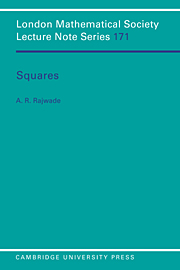Book contents
- Frontmatter
- Contents
- Preface
- Notation
- Chapter 1 The theorem of Hurwitz (1898) on the 2, 4, 8-identities
- Chapter 2 The 2n-identities and the Stufe of fields: theorems of Pfister and Cassels
- Chapter 3 Examples of the Stufe of fields and related topics
- Chapter 4 Hilberts 17th problem and the function fields ℝ(X), ℚ(X) and ℝ(X, Y)
- Chapter 5 Positive semi-definite functions and sums of squares in ℝ(X1X2, … Xn)
- Chapter 6 Introduction to Hilbert's theorem (1888) in the ring ℝ[X1, X2, … Xn]
- Chapter 7 The two proofs of Hilbert's main theorem; Hilbert's own and the other of Choi and Lam.
- Chapter 8 Theorems of Reznick and of Choi, Lam and Reznick
- Chapter 9 Theorems of Choi, Calderon and of Robinson
- Chapter 10 The Radon function and the theorem of Hurwitz-Radon (1922–23)
- Chapter 11 Introduction to the theory of quadratic forms
- Chapter 12 Theory of multiplicative forms and of Pfister forms
- Chapter 13 The rational admissibility of the triple (r, s, n) and the Hopf condition
- Chapter 14 Some interesting examples of bilinear identities and a theorem of Gabel
- Chapter 15 Artin-Schreier theory of formally real fields
- Chapter 16 Squares and sums of squares in fields and their extension fields
- Chapter 17 Pourchet's theorem that P(Q(x)) = 5 and related results
- Chapter 18 Examples of the Stufe and pythagoras number of fields using the Hasse-Minkowski theorem
- Appendix 1 Reduction of matrices to canonical forms (for Chapter 10)
- Appendix 2 Convex sets (for chapters 6, 7, 8, 9)
- References
- Index
Chapter 7 - The two proofs of Hilbert's main theorem; Hilbert's own and the other of Choi and Lam.
Published online by Cambridge University Press: 27 October 2009
- Frontmatter
- Contents
- Preface
- Notation
- Chapter 1 The theorem of Hurwitz (1898) on the 2, 4, 8-identities
- Chapter 2 The 2n-identities and the Stufe of fields: theorems of Pfister and Cassels
- Chapter 3 Examples of the Stufe of fields and related topics
- Chapter 4 Hilberts 17th problem and the function fields ℝ(X), ℚ(X) and ℝ(X, Y)
- Chapter 5 Positive semi-definite functions and sums of squares in ℝ(X1X2, … Xn)
- Chapter 6 Introduction to Hilbert's theorem (1888) in the ring ℝ[X1, X2, … Xn]
- Chapter 7 The two proofs of Hilbert's main theorem; Hilbert's own and the other of Choi and Lam.
- Chapter 8 Theorems of Reznick and of Choi, Lam and Reznick
- Chapter 9 Theorems of Choi, Calderon and of Robinson
- Chapter 10 The Radon function and the theorem of Hurwitz-Radon (1922–23)
- Chapter 11 Introduction to the theory of quadratic forms
- Chapter 12 Theory of multiplicative forms and of Pfister forms
- Chapter 13 The rational admissibility of the triple (r, s, n) and the Hopf condition
- Chapter 14 Some interesting examples of bilinear identities and a theorem of Gabel
- Chapter 15 Artin-Schreier theory of formally real fields
- Chapter 16 Squares and sums of squares in fields and their extension fields
- Chapter 17 Pourchet's theorem that P(Q(x)) = 5 and related results
- Chapter 18 Examples of the Stufe and pythagoras number of fields using the Hasse-Minkowski theorem
- Appendix 1 Reduction of matrices to canonical forms (for Chapter 10)
- Appendix 2 Convex sets (for chapters 6, 7, 8, 9)
- References
- Index
Summary
The main part of Hilbert's Theorem 6.1 is the following
Theorem 7.1. (Hilbert, 1888)Every PSD ternary quartic is a sum of squares of ternary quadratics and indeed three squares always suffice.
We plan to give two proofs in this chapter. The first proof, due to Choi and Lam [C9], uses arguments from elementary analysis – and also makes use of the Krein-Milman theorem, which is a popular tool of functional analysts. This proof only shows the first part of the theorem, i.e. that P3, 4 = Σ3, 4.
The second proof is Hilbert's original. To give the Choi-Lam proof we need the following.
Lemma 1. Let T(X, Y, Z) ∈ R3, 4. Then there exists a quadratic form q(X, Y, Z) (≠ 0) such that T ≥ q2, where by T ≥ q2 we mean of course that the form T – q2 ≥ 0 i.e. is PSD.
Proof. Let S(T) denote the set of zeros of T.
Case 1: S(T) = φ. Consider the positive continuous function
defined for all (X, Y, Z) ≠ (0, 0, 0). On the unit sphere S2 (a compact set) let μ = inf j ≥ 0. By compactness of S, μ is attained, i.e. μ = j(α, β, γ) for some (α, β, γ) ∈ S2; so μ ≠ 0 since S(T) = φ. Thus We claim that (7.1) holds for all the points of R3; for let (α, β, γ) ≠ (0, 0, 0) be any point of R3 and let.
Information
- Type
- Chapter
- Information
- Squares , pp. 85 - 93Publisher: Cambridge University PressPrint publication year: 1993
